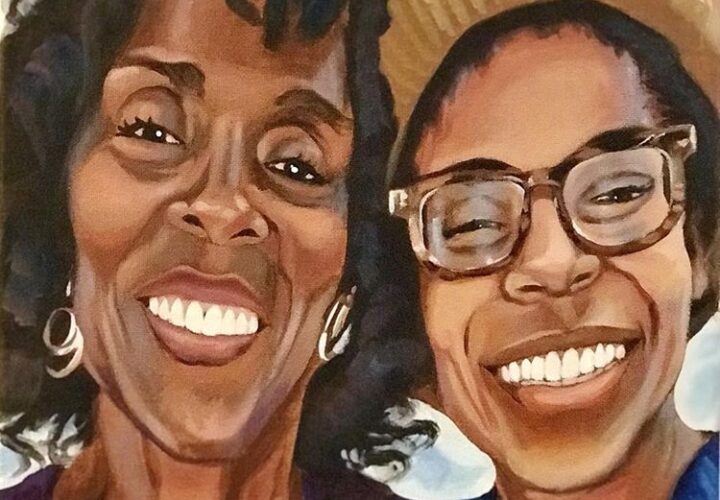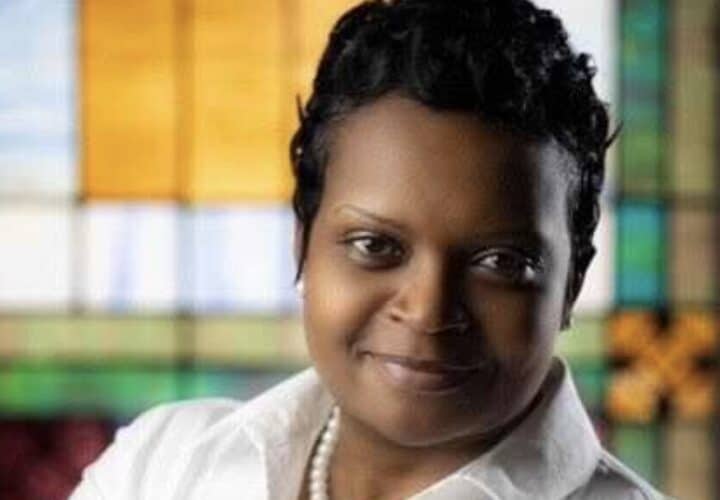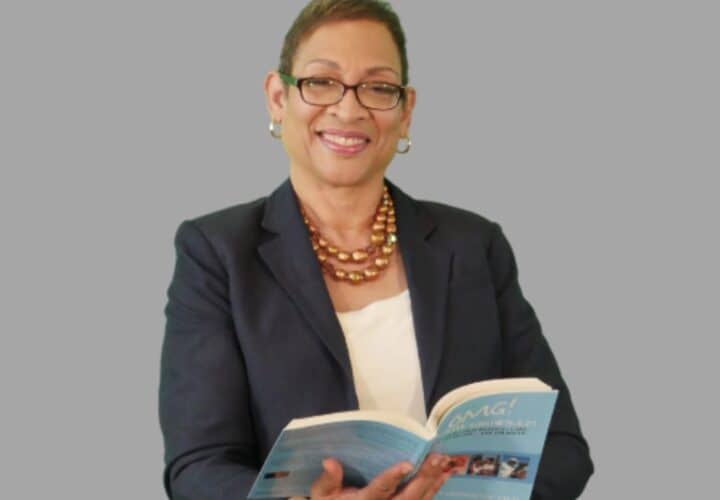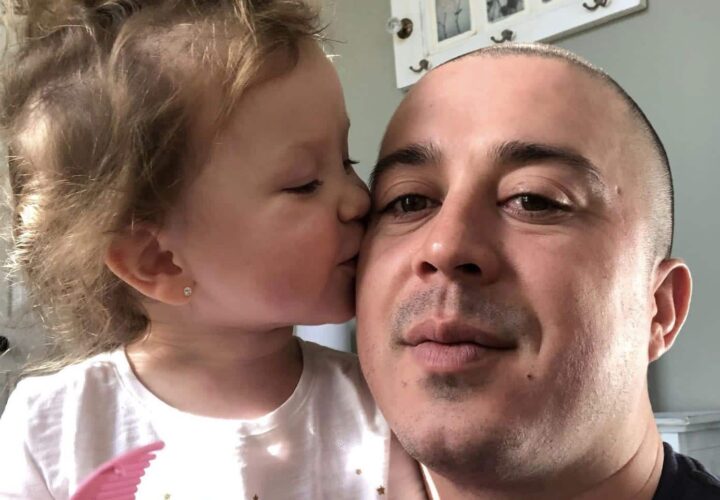Jacquelyn Revere sheds light on the challenges faced by young dementia caregivers through her incredibly popular TikTok account @MomOfMyMom.
This article is part of the series Diversity & Dementia, produced by Being Patient with support provided by Eisai.
In May of 2016, Jacquelyn Revere was living an exciting, fast-paced life in New York City, en route to a comedy show, when she received an unexpected phone call from a friend of her mother’s. Jacquelyn was surprised that she was even able to answer a phone call while on the subway, and she was even more caught off guard when she was told that she needed to fly home as soon as possible because something was wrong with her mom. Jacquelyn would soon learn that both her mother and grandmother were living with dementia and in need of full-time care — a job for which Jacquelyn, an only child, was the sole prospect.
Over the past five years, Jacquelyn, 34, has learned how to maintain a sense of self despite the demands of caregiving, as well as how to adapt to the unique needs of dementia. In 2020, she began sharing her experiences on TikTok under the username @MomOfMyMom, and has since garnered over half a million followers and more than fifteen million likes across her video library. Jacquelyn’s content includes inventive solutions that help keep her mother, Lynn Hindmon, 63, happy and safe, as well as touching and humorous moments between the two, support for fellow caregivers, and brain elasticity exercises.
In an exclusive interview, Being Patient spoke with Jacquelyn Revere about her experience as a millennial dementia caregiver, a popular social media figure, and a community support organizer.
On the phone call that changed everything:
Being Patient: Take me back to when you received this life-changing phone call in 2016. What happened from there?
Jacquelyn Revere: It was May of 2016. It was on a Saturday night, I was on the subway going to see a few friends perform at a comedy show, and I got a phone call while I was on the subway. It’s weird enough that the phone call even went through, more so that I could answer it and realize that it was something serious. So, I got off on the next stop, talked to my mom’s friend who said, ‘You need to fly home.’ I ended up getting back on the subway and trying to continue that night, but the night was ruined. That was on a Saturday, and the following Thursday is when I ended up flying home.
Being Patient: What was it that your mother’s friend had noticed to make her think that something was very wrong?
Jacquelyn Revere: She was pretty vague in that phone call, more so [saying], ‘It’s important. Something’s wrong with your mom. You need to fly home now.’ But then she later went into detail explaining that when she (Lynn) was driving home, she got lost, and what should have been a 15-minute ride home, which is what she does every day, ended up turning into two hours of her just kind of driving around figuring it out. There were foreclosure letters. Her ability to maintain her attention span was super short. She was having a hard time following through with conversations and whatnot, so it was a lot of things like that.
Being Patient: And so your mother was only, what, 58 or 59 years old at the time?
Jacquelyn Revere: She was 59.
Being Patient: What did you observe when you went home after receiving the call?
Jacquelyn Revere: Once I got home, I could see that the fridge was overflowing with food. There was rotten food, and that was just not my mom at all. The house wasn’t really clean, which is not her at all either. There were foreclosure letters, and as soon as I moved home it felt like the house just started falling apart: pipes bursting, maintenance for the house wasn’t kept up on. My grandmother had different piles where she had her own food, or she would put food in her purse.
Being Patient: Had there been any diagnoses at that point? Where were you in the medical stages of everything?
Jacquelyn Revere: So, my grandmother had been diagnosed [with dementia] around 2014. My mom on the other hand, that’s when we started taking her to doctors. Her healthcare [insurance] was turned off, so I had to go through Medicaid and get approved, and so on, and then get her on disability because she was too young for her Medicare to start. And so, all of that was a process. We went to doctors upon doctors, to tests upon tests, until they finally let us see a neurologist. As soon as we got the diagnosis from them, that’s when I was then able to do more things to help her, but at that same time, my grandma started getting worse. She stopped eating food. And so then, as I was getting the diagnosis for my mom, my grandmother’s health very quickly started to deteriorate.
Being Patient: When did you decide that you needed to become the full-time caregiver for your grandmother and mother?
Jacquelyn Revere: That happened when I first came home. I took the 21 day leave from work and once I hit day 19 to 20, I just sort of knew that I would either have to sell the house, put them both in homes, and then like, move on with my life. But because my grandmother was so combative, I just knew that putting her in a home for someone else to care for [her] just wouldn’t have been the best environment for her. It was a lot of financial things also that forced me to make the choice.
On the birth of ‘Mom of My Mom’:
Being Patient: So, I want to talk about an interesting theme, as obviously the username of your account is “Mom of my mom,” and I’ve seen in some of your videos that your own mom now calls you Mom sometimes. You also mentioned once that you stopped calling your mother, Mom, to try and differentiate your mother from this new woman affected by the disease. How has that role reversal been for you, and how has it contributed to your dynamic as a caregiver, with your mother?
Jacquelyn Revere: Yeah, it’s hard. I mean, I think it’s a way for me to cope, more so than me drawing a line. I’ve essentially lost my mom. And so calling her that, when to me she’s not really that, makes it harder I think, especially when I have to care for her. And for me, I just think that it’s a way to continue coping.
Being Patient: What made you want to start posting about your mother on social media and sharing your story with the world?
Jacquelyn Revere: Because I felt like I was the only one and prior to that, I had made a lot of stuttering content and I specifically made stuttering content because I felt like I was the only person. And so, I tend to make content to fill a void. Whether it’s a void for people who stutter, whether it’s a void for people who care for someone, whether it’s a void of someone who is losing their life to something that they can’t control, it’s just trying to find other people who can understand what I’m going through so that I don’t feel so lonely, and it just happened to really hit with Mom of my mom.
Being Patient: What was the first video to go viral that made you realize you have a growing platform and audience? What did it feel like when your account started growing and gaining traction?
Jacquelyn Revere: So, the first video that hit like five hundred thousand [views] was me kind of talking about how I make this certain dish, candy carrots, for my mom in the air fryer. I mentioned that I take care of her also and some people were more hooked onto that part and I was like, ‘Oh okay.’ And I thought it was really sweet. I personally just thought that people liked it because it was an air fryer recipe.
@momofmymom The one semi healthy snack I can always get my mom to eat Alzheimer’s #dementia #caregiver #tips #airfryer
But we really, really, really went viral with this one video that got like seven million views, [where] my mom was looking at baby pictures with her and I. And she looked at the picture and called me her mommy. And, it fits our name so perfectly and it also kind of like really fits what happens when you begin caring for someone, especially someone who has dementia.
@momofmymom My heart yall💜 #alzheimer #dementia #momofmymom #caregiversoftiktok
Being Patient: What is your mission or goal moving forward with this account, now that you have such a large platform? What are you hoping to share with people or educate them on through your videos?
Jacquelyn Revere: It’s interesting that you asked that because it’s evolving all the time. My goal is to make sure that other caregivers out there don’t feel like they’re the only ones out there. My goal is specifically to make sure that other millennial caregivers don’t feel like they’re the only ones out here and [even] younger, too, because there are kids who are in high school, helping to care for their grandparents. So, I just want to create a space where people can come in, and not only learn new ways to approach dealing with their loved one but do it in a fun way. I don’t want to bore people with just tons of content about eldercare. There are so many places where you can find that sort of [content]. I also want people who have lost someone to come to our page and look at our memories, and then have that spur some of their own. So, I really wanted [the account] to just be a place of like mental healing.
“My goal is to make sure that other caregivers
out there don’t feel like they’re the only ones out there.”
Being Patient: Is the majority of your TikTok audience in the Millennial and Gen Z age range?
Jacquelyn Revere: The bulk of my followers, my “Mom of my mom” loved ones, which is what we call them, are ages 24 to 34, and so I do think that I hit that target where people are seeing their parents manage their grandparents. Some people who are like 26 to 27 [years old] have said that their parents have started showing signs [of dementia] and so, those years of freedom that we used to get seems to be shortening, because we take on the jobs of caring for those who raised us much sooner. When I first started caring for my mom, all of these support groups that I would go to were filled with people who were like 45 [years old] at the time, and they were caring for their parents. Now the people who I’m talking to are in their 20s. And so, I do think we’re targeting an age group of people who are experiencing this, maybe not in the same way as the older generation is, but still in a very real way.
On advice for fellow caregivers:
Being Patient: What is your main message that you would say to anyone who is currently acting as a caregiver for someone with dementia?
Jacquelyn Revere: It gets better. I think more than anything, I stress that they continue to keep a sense of self. I think that what’s most important is not getting swallowed up in what it means to care for someone, and to still maintain a sense of self. You won’t care for someone for forever. And once you’re done caring for that person, what’s left is you, and if you’ve given up everything, then there is nothing. And so, I just really want to stress to people the importance of still making sure that you take one class per week that is all about you or take yourself out on a date. Find some time and make some time for you. It’s important. I’ve really fought to still know who I am outside of being the person that cares for my mom, and I think if we can all figure out how to do that, then we can survive this.
“I’ve really fought to still know who I am outside of being the person
that cares for my mom, and I think if we can all figure
out how to do that, then we can survive this.”
Being Patient: Do you have any tips for caregivers on how to create a village and to get help from other people and not feel like the burden is all on you?
Jacquelyn Revere: I’m in a very privileged position that I’m not sure if most people are in. I have been able to rent out rooms at a discounted price in exchange for help, which has been fantastic. But I can’t put that on everybody. But I do think there could be some sort of swap, maybe like, if I watch your son one night a week, you can watch my mom. I think that especially because home care is so expensive, people will end up paying 35 to 40 dollars an hour, which quickly adds up. So, I think that finding a barter system with people that you trust, specifically, [can help, but it] will take a lot of time. It’s taken me years, and I’m still figuring it out.
But I think even on top of that, I want to urge everyone to start talking about what the future looks like, as it pertains to care. It’s something that we don’t talk about a lot. And I think that when you don’t talk about it, that’s when you put people in compromising situations. And so, the more we talk about it, the more we can stand, especially because my mom doesn’t want for me to end my life to care for her. That wasn’t her hope. And I know that if she had known that something like this was going to happen that she would have been planning for it this entire time. So, I think if we have these conversations, then we can at least start planning, making changes, or even change legislation.
On Racial Inequity in the Health Care System:
Being Patient: While African Americans are two times more likely to get Alzheimer’s compared to white Americans, they’re less likely to get a diagnosis and when they do, it’s often much later. Have you felt within your family that you’ve encountered any challenges throughout the medical system, or a lack of resources?
Jacquelyn Revere: Yes, but I think that there’s more than one reason. I think me being a person who stutters, advocating for my mom and trying to speak for her poses its own issues. I’m fairly fluent right now, but especially when I first moved home, I was overtaken with sadness and sorrow, not knowing what to do, uncertainty, and so on. And all of that affects your speech. And so, just being a disabled woman trying to talk to doctors and being shut down and having the phone hung up, it was a lot of work trying to get Social [Security]. I remember this one time I was on hold for Social Security for like 40 minutes, and then by the time I got through, I was having a hard time saying hello, and they hung up on me, and that’s very consistent for people who stutter.
I don’t know if this is all attributed to us being African American, but having my mom’s insurance shut off and having to go through Medicaid to then get to Medicare, it all elongated our process when if we just had a PPO (Preferred Provider Organization), it would have happened so much quicker. So, I think the access to health care [was a factor].
My grandmother, when I was caring for her, had a severe distrust of doctors in the medical field from her own history and the history of medical care in the country, especially for Black people. And so, the country’s history of care becomes something else that I have to carry when trying to get her in the car. So, it’s all exhausting. Absolutely.
What’s next for Mom of My Mom:
Jacquelyn recently hosted a virtual “Chat & Sip” event for millennial caregivers to relax, grab a drink and discuss their experiences with each other, as she continues to ensure that other caregivers never feel as if they are alone. Follow along on TikTok, Instagram, or YouTube and Patreon.
The interview has been edited for length and clarity.



